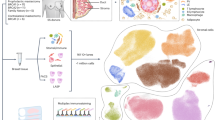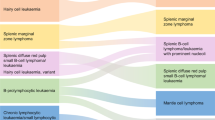Abstract
Acute lymphoblastic leukemia (ALL) with a high hyperdiploid clone has a good prognosis for both childhood and adult patients while patients with Philadelphia-positive (Ph) ALL do badly at all age groups. It has been suggested that different responses to treatment might be related to the cell of origin of the leukemia with ‘stem cell’ cases responding less well than those arising in a lymphoid committed progenitor cell. The clonal involvement of different cell lineages in 12 patients with acute lymphoblastic leukemia has been examined by applying fluorescence in situ hybridization (FISH) to detect chromosomal abnormalities in bone marrow cells previously identified by morphology and/or immunology. The karyotype of the malignant clone was either high hyperdiploid or Philadelphia translocation (Ph) positive with a breakpoint in the minor breakpoint cluster region of the BCRgene (m-BCR) or in the major breakpoint cluster region of the BCR gene (M-BCR). The high hyperdiploid clone, in each case, was found in cells of the B-lymphoid (CD19+) lineage but not in T cells (CD3+) or in cells of the myeloid (CD13+) or erythroid (glycophorin A+) lineages, indicative of a lymphoid committed progenitor cell. Heterogeneity of lineage involvement was found in Ph+ ALL: the m-BCR Ph+ clone was found in lymphoid/blast cells but not in neutrophils or eosinophils. In contrast both M-BCR Ph+ clones were detected in myeloid as well as lymphoid lineages, indicative of a stem cell origin.
This is a preview of subscription content, access via your institution
Access options
Subscribe to this journal
Receive 12 print issues and online access
$259.00 per year
only $21.58 per issue
Buy this article
- Purchase on Springer Link
- Instant access to full article PDF
Prices may be subject to local taxes which are calculated during checkout
Similar content being viewed by others
Author information
Authors and Affiliations
Rights and permissions
About this article
Cite this article
Kasprzyk, A., Harrison, C. & Secker-Walker, L. Investigation of clonal involvement of myeloid cells in Philadelphia-positive and high hyperdiploid acute lymphoblastic leukemia. Leukemia 13, 2000–2006 (1999). https://doi.org/10.1038/sj.leu.2401580
Received:
Accepted:
Published:
Issue Date:
DOI: https://doi.org/10.1038/sj.leu.2401580
Keywords
This article is cited by
-
In Utero Development and Immunosurveillance of B Cell Acute Lymphoblastic Leukemia
Current Treatment Options in Oncology (2022)
-
BCR/ABL genes and leukemic phenotype: from molecular mechanisms to clinical correlations
Oncogene (2002)
-
Two Groups of Philadelphia Chromosome—Positive Childhood Acute Lymphoblastic Leukemia Classified by Pretreatment Multidrug Sensitivity or Resistance in In Vitro Testing
International Journal of Hematology (2002)
-
Modeling Philadelphia chromosome positive leukemias
Oncogene (2001)



